In 2024, Singaporeans are shopping online more than ever before. Approximately 62.8% of Singaporeans buy online every week. The average revenue generated per user is about US $1,400, making it the highest-grossing market in Southeast Asia. If you are an e-commerce seller looking to enter the Singapore market or are exploring what to sell online in the region, we’ve got you covered. Here is a curated list of the top 16 high demand products in Singapore to help you understand what your Singaporean shoppers are purchasing online.
After all, it’s not enough to just have great products; it’s essential to know which ones are trending.
16 Top-Selling Product Categories in Singapore Online
Identifying the top-selling products in Singapore is the first step toward understanding e-commerce trends and the needs of online shoppers. Let’s dive in!
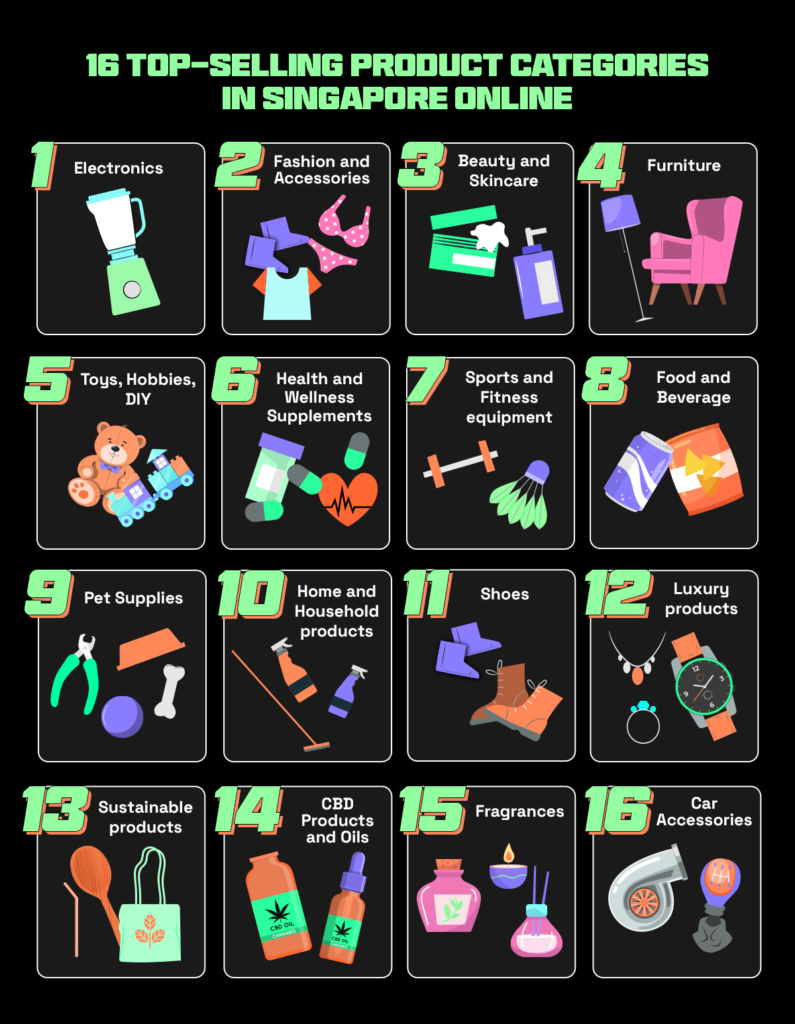
(1) Electronics
In 2024, the consumer electronics market generated a whopping revenue of US $1918 million. Singaporeans are very tech-savvy and drive demand for the latest gadgets. For instance, 97% of residents own smartphones and 99% of homes have internet access. Other popular products include laptops, iPads, earphones, smart watches, television, and PC accessories.
Fun fact: Google searches for iPhones peak on 24th December, indicating that gadgets and computer appliances are popular Christmas gifts.
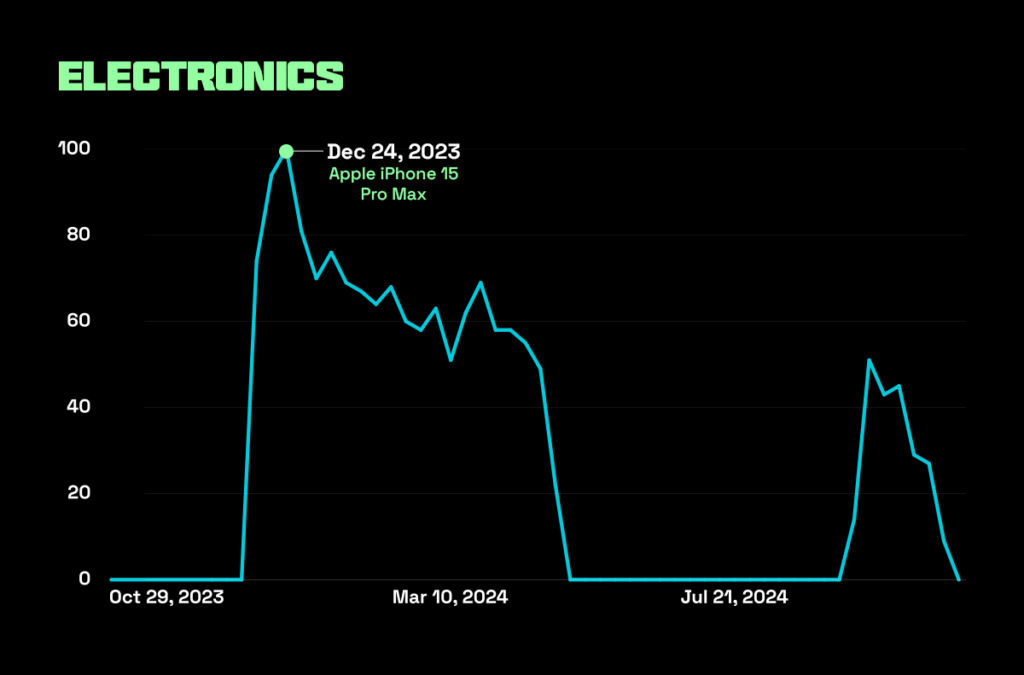
Last – mile delivery makes up 50% of the total shipping costs. It’s time to change that!
Partner with Locad to get access to the most cost effective last-mile carriers!
(2) Fashion and accessories
Singapore is a melting pot of cultures, with residents belonging to Chinese, Malay, and Indian ethnicities. As a result, the city-state hosts an environment where global fashion is quickly adopted. By 2029, Singapore will have nearly 4.7 million fashion consumers with a user penetration of 77.7%. Social media trends like OOTD (outfit of the day) and fashion influencers have played a key role in driving fashion demand in Singapore. The region is also a great market for experimenting with new verticals like sustainable fashion and gender-fluid fashion.
Fashion retailers in Singapore struggle with overstocking leading to high storage costs.
Track inventory levels in real time with Locad to avoid stock outs and overstocking.
(3) Beauty and skincare
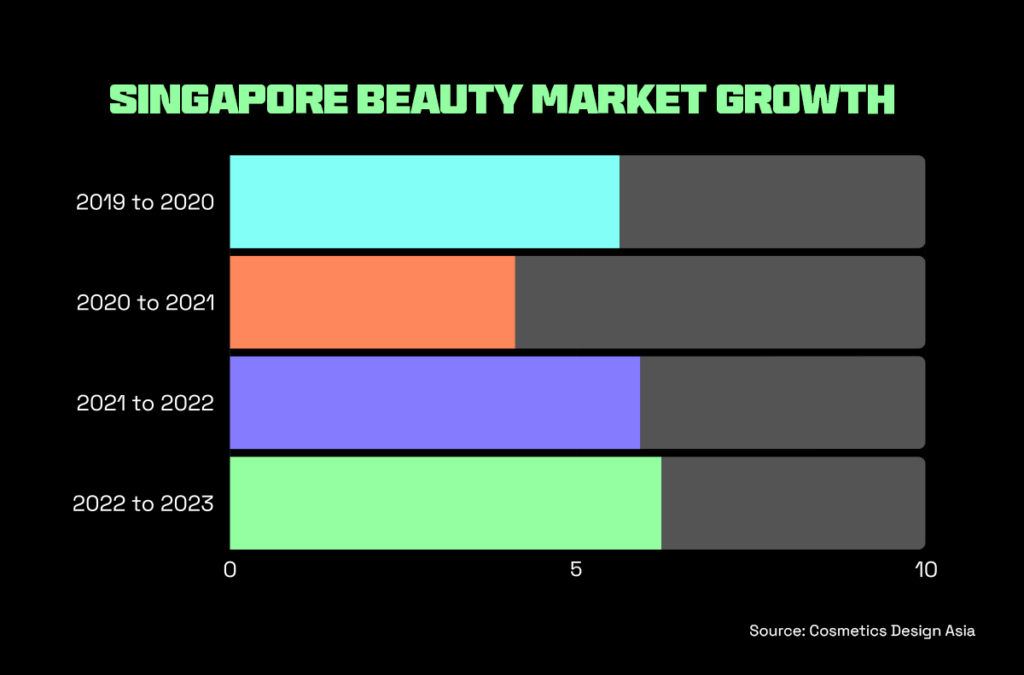
The skincare industry occupies a lion’s share of 7.8% of the total e-commerce market in Singapore. The online sales value of beauty and skincare products is about US $232.6 million. During a recent 10.10 sale Locad found that 8 of the top 10 best-selling products in Singapore were beauty items – skin toners, serums, and fillers. So where did it all begin? In the 2010s, when K-Pop took over Singapore, Korean beauty products gained widespread popularity and continue to dominate the market. The majority of Singapore’s residents are of Chinese descent. The perception that Asian products can effectively address Asian skin concerns drives the sales of K-beauty products. Singapore’s skincare market is also heavily influenced by its climate. The country has hot weather throughout the year, which influences the sales of sunblock sprays, mists and more.
Ready to grow your skincare brand?
Discover how Locad helped DMD skin sciences expand into new marketplaces and increase order volumes by 200%!
(4) Furniture
A popular furniture website in Singapore receives traffic of 625,855 visitors per month. In September 2024 alone, the revenue generated by E-commerce furniture was USD $53 million. Case in point – the e-commerce furniture market in Singapore is growing at a rapid pace. After the pandemic, many Singapore employees preferred to have the flexibility of working from home. The rise of remote work has led to a surge in demand for ergonomic chairs, standing desks, and other home office essentials. Accessories like lamps, throw pillows, shelves, and table runners have also risen in popularity. For instance, the sales of lamps amounted to US $151.1 million in 2024.
Need a smarter solution for managing the logistics of bulky furniture?
With Locad, pay only for the inventory space you use.
(5) Toys, Hobby, DIY
In 2023, Amazon Singapore generated a revenue of US $11.1 million through toys alone. Currently, online sales of toys has a market share of 15% in Singapore and is expected to increase in the years to come. Parents are actively seeking out educational toys that are fun and nurture cognitive development. Sustainable toys are also rising in popularity as consumers become more environmentally conscious. However, children aren’t the only consumers of games.
Games seem to have carved a niche audience among adults as well. Adult consumers are frequently visiting board game cafes as they seek out unique social experiences. In fact, google searches for board game cafes consistently tend to be high!
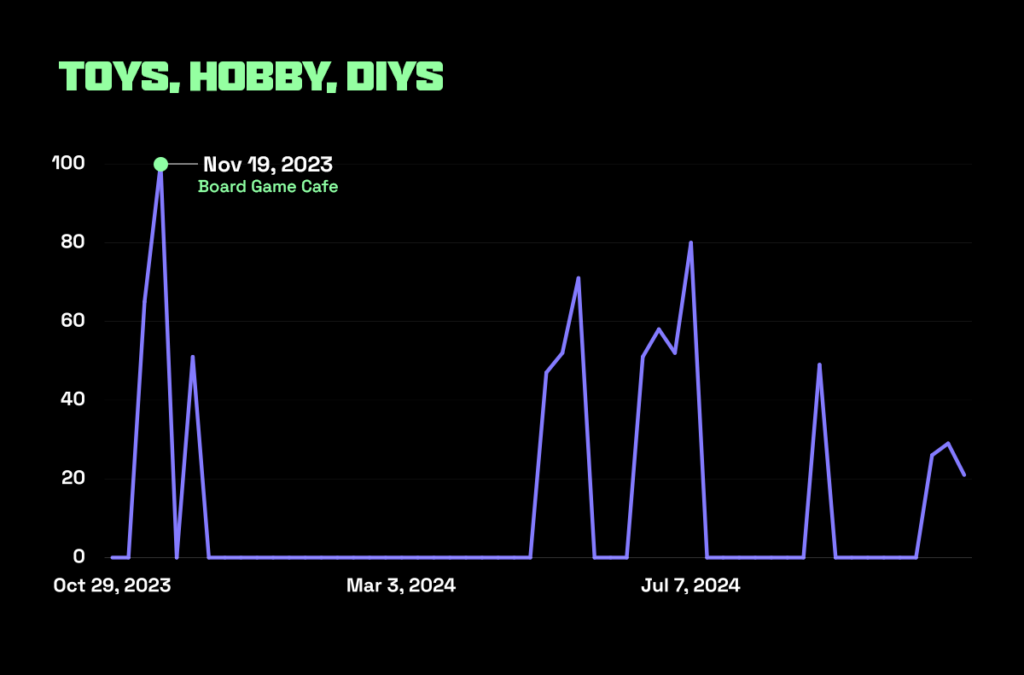
(6) Health and wellness products
Singapore’s health supplements market is worth $202.8 million. The industry, which consists of vitamins, dietary supplements, and functional foods, has been growing steadily at a rate of 3.81%. This growth can be attributed to the heightened awareness of health among Singapore’s residents. Preventive healthcare is in the spotlight, and consumers are turning towards traditional recipes that use ingredients like turmeric and ashwagandha. Data shows that in 2023, Singapore imported health supplements worth $15.54 million from the U.S. Popular products include multivitamins, probiotics, skin and hair health, weight loss, stress management, etc.
Are you looking to import products from other countries?
Locad simplifies cross-border commerce with IOR services, ensuring smooth customs clearance.
(7) Sports and fitness equipment
In 2023, sports participation among Singaporeans hit an all-time high. The top 3 activities for young adults included jogging, walking, and cycling. Currently, the online share of the sports equipment retail market in Singapore is 21.4%, making it one of the most trending products in the Singapore e-commerce market.
As more Singaporeans adopt active lifestyles, athleisure wear has become a staple both in and out of the gym. More and more consumers are seeking specialized fitness sessions like cross-training, pilates, and yoga, which is increasing the demand for athleisure. Wearables, such as smartwatches and fitness trackers, are gaining popularity, helping consumers monitor their health more effectively. The use of AI and data analytics in sports is also leading to the advent of personalized fitness coaching. In addition, a love for outdoor sports like Soccer and Cricket also contributes to this growing market.
(8) Food and beverages
In 2023, the canned food market in Singapore was valued at US $2.15 billion. By 2030, it will reach a value of US $4.77 billion. This significant growth can be attributed to the increasing consumer demand for convenient, long-lasting food options. With more disposable income, busy professionals turn to canned foods for their long shelf life. Singapore also showcases a high demand for herbs and spices because of ethnic diversity among residents. A key factor driving this market is the awareness of the health benefits of various herbs. For example, search trends for turmeric remain high throughout the year.
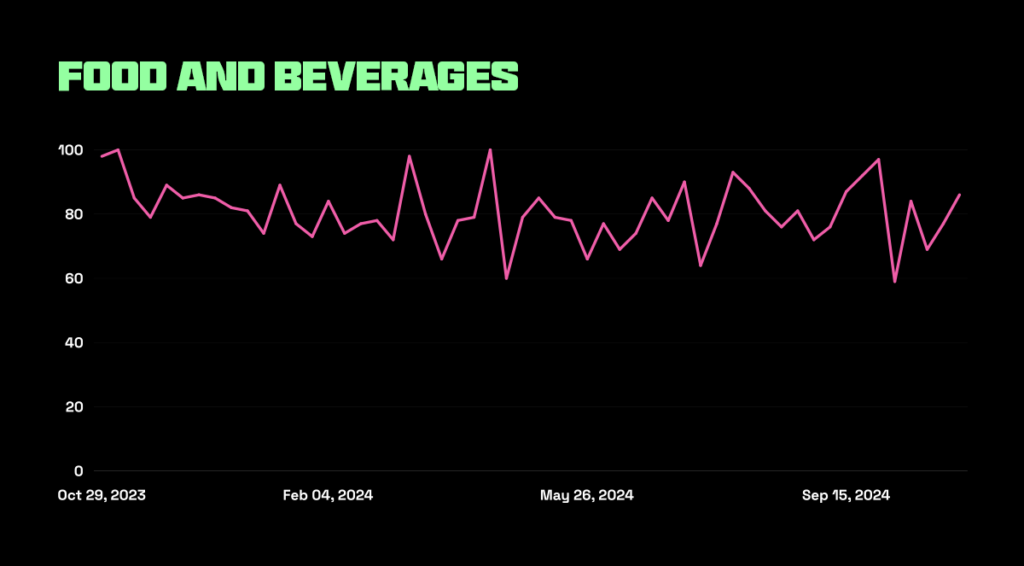
Major players in this market include Lazada, Amazon, and Shopee. Another trend observed in this market is an inclination towards locally sourced foods. By 2030, the Singaporean government aims to produce 30% of their food locally, to enable a sustainable supply chain.
With Locad’s First In, First Out (FIFO) system, you can ensure the freshest products reach your customers first.
(9) Pet supplies
In 2022, about 33% of Singapore residents owned at least one pet. Since then, the number of pet parents has increased the demand for pet products. Today, the pet supplies market in Singapore accounts for 18.4% of the total e-commerce market. 29% of pet parents are ready to spend 20-50 Singapore dollars monthly on pet products. Google search trends for ‘dog food’ continue to rise throughout the year.
In recent years, many consumers have shown a shift towards second-hand pet items – beds, cages, etc. Buying and reselling of pre-loved pet products has increased as the modern-day Singapore customer prioritises sustainability. According to Jing, the head of the online marketplace Carousell cat items are among the top search terms in the pet supplies category.
(10) Home and household products
In the Singapore home products market, online shopping occupies a market share of 29.5%. This is expected to continue to grow in the coming years. Subscription services for home essentials are gaining popularity, allowing consumers to receive regular deliveries of items such as cleaning supplies and kitchen products. Price sensitivity is also evident, with 80% of Singaporeans now paying closer attention to prices. Data shows that consumers are constantly on the lookout for the best deal. Many shoppers visit an average of 2.9 stores before making a purchase.
The kitchenware market in Singapore is also thriving as more consumers are investing in quality cookware and utensils for their homes. Consumers are increasingly turning towards non-stick pans, eco-friendly utensils, and multifunctional gadgets. In 2024, the revenue generated by kitchenware was US $33.4 million. Online channels account for about 30% of the total sales – making it a top-selling product in e-commerce.
Monitor your inventory health in real-time, so you’re always stocked and ready to deliver.
Locad is here to help you scale and grow your business.
(11) Shoes
The shoe market in Singapore is thriving, driven by a blend of fashion trends, sports influences, and a focus on comfort. The most popular segment in this market is the Boots segment, with a market volume of US $507.9m. It is estimated that in 2024, the average consumer will own 4.92 pairs of shoes. A clear shift in consumer preferences is also seen towards eco-friendly footwear options. Moreover, 79% of sales in footwear will come from non-luxury brands.
To thrive in this segment, merchants should adapt to fast-changing fashion trends and optimize for e-commerce. The primary drivers of growth in the footwear segment include a rise in disposable incomes, growing infrastructure, and positive growth of GDP.
(12) Luxury Products
A recent survey found that 1 in 2 Singaporean consumers plan to buy luxury products in the next 12 months. Online marketplaces and channels for luxury goods are also witnessing rapid growth. As a result, different brands like Chanel and Gucci have been racing to optimize their online stores. For instance, in 2020 Prada strengthened its digital-first strategy by launching an online store in Singapore. A large number of luxury goods consumers are influenced by what they see on the internet. This is further nudging the online sales of luxury goods.
The most popular category is apparel and shoes. Next comes household appliances and farm produce.
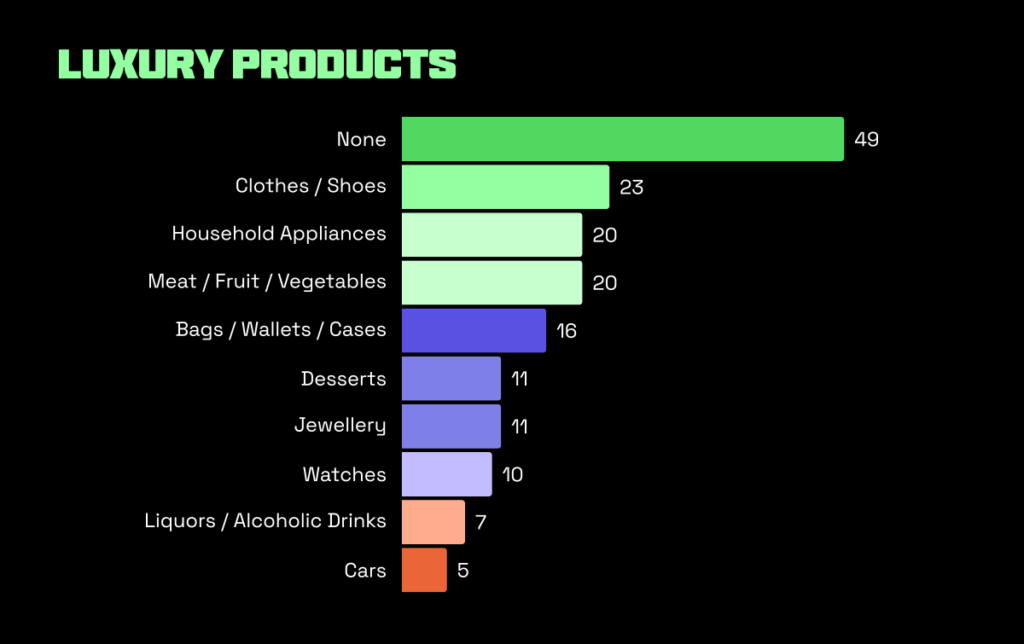
(13) Sustainable products
The demand for sustainable products is rapidly gaining traction in Singapore, as more consumers prioritize ethically sourced items. In fact, 64% are willing to pay a premium for sustainable products. 1 in 3 consumers opt for reusable packaging when shopping online. 90% of retailers have also said that they found it efficient to implement reusable packaging.
Brands offering organic skincare, solid shampoo bars, and bamboo toothbrushes have seen increasing demand as consumers seek to reduce their environmental footprint. In the fashion industry, sustainable materials like organic cotton, recycled fabrics, and ethically sourced textiles are becoming mainstream. Singaporean consumers are also gravitating towards slow fashion, supporting brands that prioritize fair trade practices and sustainable production processes.
Choose sustainable packaging with Locad!
We offer custom packaging solutions that help reduce waste while delivering your products efficiently.
(14) CBD products and oils
The CBD market in Singapore is witnessing a remarkable surge in interest as more consumers seek the therapeutic benefits of cannabidiol. This market was valued at $13.4 Mn in 2022 and is projected to reach $74.2 Mn by 2030.
The broader trend towards health and wellness is contributing to the demand for CBD products. Consumers are looking for natural alternatives to manage stress, anxiety, and other health concerns, which positions CBD as an appealing option. Due to regulatory restrictions, marketing CBD products can be challenging. Brands must navigate compliance issues while effectively communicating the benefits of their products to potential customers.
(15) Perfumes and colognes
The fragrance market is not just about scent. It showcases luxury, self expression and identity. In Singapore, consumers are shopping for fragrances more than ever before. Data shows that online channels make up a whopping 66% of the sales. It is projected that by 2029, the number of consumers will reach 1.1 million. There is also a growing demand for natural fragrances, eco-friendly scents and essential oils.
Stay on top of your perfume inventory with Locad!
Know how quickly your products are moving and make informed decisions to maximize sales.
(16) Car accesories
With a growing number of car owners in Singapore, the demand for car accessories has seen a significant rise. The automotive products market is expected to generate an additional economic value of US $3.6 billion in 2024. The manufacturing intensity of these products is also expected to increase to 2.8%. Consumers are increasingly looking for customizable accessories that allow them to personalize their vehicles. This trend is particularly popular among younger car enthusiasts who want unique modifications.
Conclusion
In conclusion, the booming e-commerce market in Singapore offers incredible opportunities for sellers. By leveraging insights into high-demand products and partnering with fulfillment partners like Locad, you can streamline your operations, reduce costs, and meet your customers’ needs efficiently. As online shopping continues to grow, having the right products and fulfillment strategies in place will position your business for long-term success in this dynamic market.









